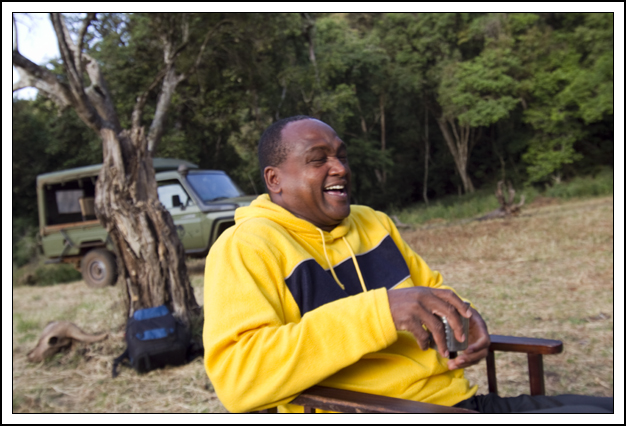This morning when I got up there was an askari in camp. He’d come down from his campi in the forest to let Calvin know that Robert Obrien, the head warden for Marsabit National Reserve, was flying in from Nairobi to meet us. This was quite unusual. We hadn’t requested a meeting with the warden and couldn’t imagine why he was flying all the way from Nairobi just to pay us a visit. At any rate, the askari said the warden would be here around 7:30 so as we sat around the campfire eating breakfast and drinking tea, we made wagers on when he would actually show up. I said, “Noon—if we’re lucky.”
Which was a stupid thing to say since no longer was it out of my mouth than we saw a Kenya Wildlife truck coming through the woods towards our camp. And it wasn’t even seven yet.
Feeling like an idiot, I hurried over to the warden’s truck to welcome him. There were several interesting things about Robert Obrien, not the least being his rather Irish name (for which he has no good explanation). The fact that he flies his own plane for KW is one. Another is that he is Rendille and from this area but has been fighting his own tribe to reclaim the sanctity of Paradise.
When he first was named head warden of Marsabit, which is just under the size of the Masai Mara, the area was being destroyed by cattle illegally grazing in the lush forests and meadows. “Everyone used to drive their cattle to this place,” he told us. “Then I had a meeting with the Rindelle, the Borana and told them I was closing the area to cattle completely. No more. Everyone thought I would only cause more fighting because my tribe is Rindelle but the grazing and the cattle rustling slowed. It didn’t stop, but it slowed.”
Obrien admitted that the other problem was all the bore holes in the area. “There are more than 40 bore holes around Marsabit,” he said. “When I first came here two years ago, there was no water in the lake. Now there is some, but not much. It is a continuing problem.”
His third concern is the continued deforestation of Marsabit. Every morning the women from Marsabit, at the bottom of the moutain, come into the forest to take firewood. “They take 30 to 40 big old trees every day,” he said. The wood is carried down to the town where it is sold for firewood or turned into charcoal. Obrien understands that he can’t stop the women from taking the wood unless he gives them an alternative. So he is trying to get international support for simple tools and materials that would allow the women to turn cow and even elephant dung into pellets for cooking fuel. “People need to cook their food so if you take the firewood and charcoal away from them, you have to replace it with something else.”
“Marsabit forest is the center of life in Northern Kenya,” he said “It’s the center of life both for people and for wildlife. This is the only place in the desert. Without this forest there is no possibility for life in this area. I am trying to convince the Rendille and the Borana that if we can save this forest, we can save everybody. It is the only hope for the people and for the animals.”
Tags: Lake Paradise
-
in nature, touch one thing and it touches another….
Comments are now closed.


1 comment